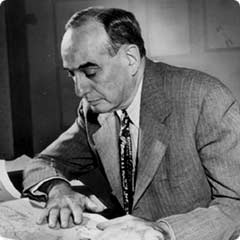« New school at AY would add 100,000 square feet | Main | PRESS RELEASE: Salon des Refusés de la Bibliothèque de Brooklyn »
February 13, 2007
Even More Moses
 More articles on the exhibits and panel discussions reconsidering the legacy of Robert Moses:
More articles on the exhibits and panel discussions reconsidering the legacy of Robert Moses:
Toronto Globe and Mail, Moses vs. Jacobs plays again
Last Thursday night, the Museum of the City of New York held a symposium titled The Lessons of Robert Moses. Most of the panelists, including Dan Doctoroff, the city's deputy mayor of economic development and rebuilding, seem to be taking the wrong lesson from the current re-evaluation of Moses. They have learned that arrogance was Moses's real sin. So their modus operandi is to appear to care about communities and then go ahead with big development plans anyway.
Doctoroff, who failed in his bid to build a stadium on the west side of Manhattan and also failed to secure the 2012 Olympics for the city, is overseeing the largest building boom in the city since Moses's era. “We definitely do not believe you need to break eggs,” he said.
That would be news to the hundreds of families and businesses in Brooklyn who will be evicted under the government's powers of land expropriation to make way for the gargantuan Frank Gehry-designed Atlantic Yards project, which will attempt to deposit a massive high-density downtown-style development (including a basketball arena and a 50-storey apartment tower) in a low-rise area of Brooklyn.
CityLimits.org, ROBERT MOSES RECONSIDERED: MOSTLY RIGHT THE FIRST TIME
So yes, this exhibition is revisionist in that it puts a more positive face on Moses than the Caro opus. Understandably, given Ballon’s expertise, the focus is on the physical results of more than 40 years of power and it does not try to probe the source of the power that allowed him to ride roughshod over anyone standing in his way. And, indeed, the physical achievements, whether judged good or bad, are undeniably mighty in breadth, scale and obstacles overcome.
But the danger in a revisionist view of history is that it takes on a life of its own. That life often then becomes myth, like the incorrect belief about Mussolini that “at least he got the trains to run on time.” Clearly, no one is all good or all bad, and Caro’s book, despite what is often said, does have positive things to say about Moses. Of Robert Moses one must ask if the damage he wrought outweighs the good.
Posted by lumi at February 13, 2007 8:42 AM